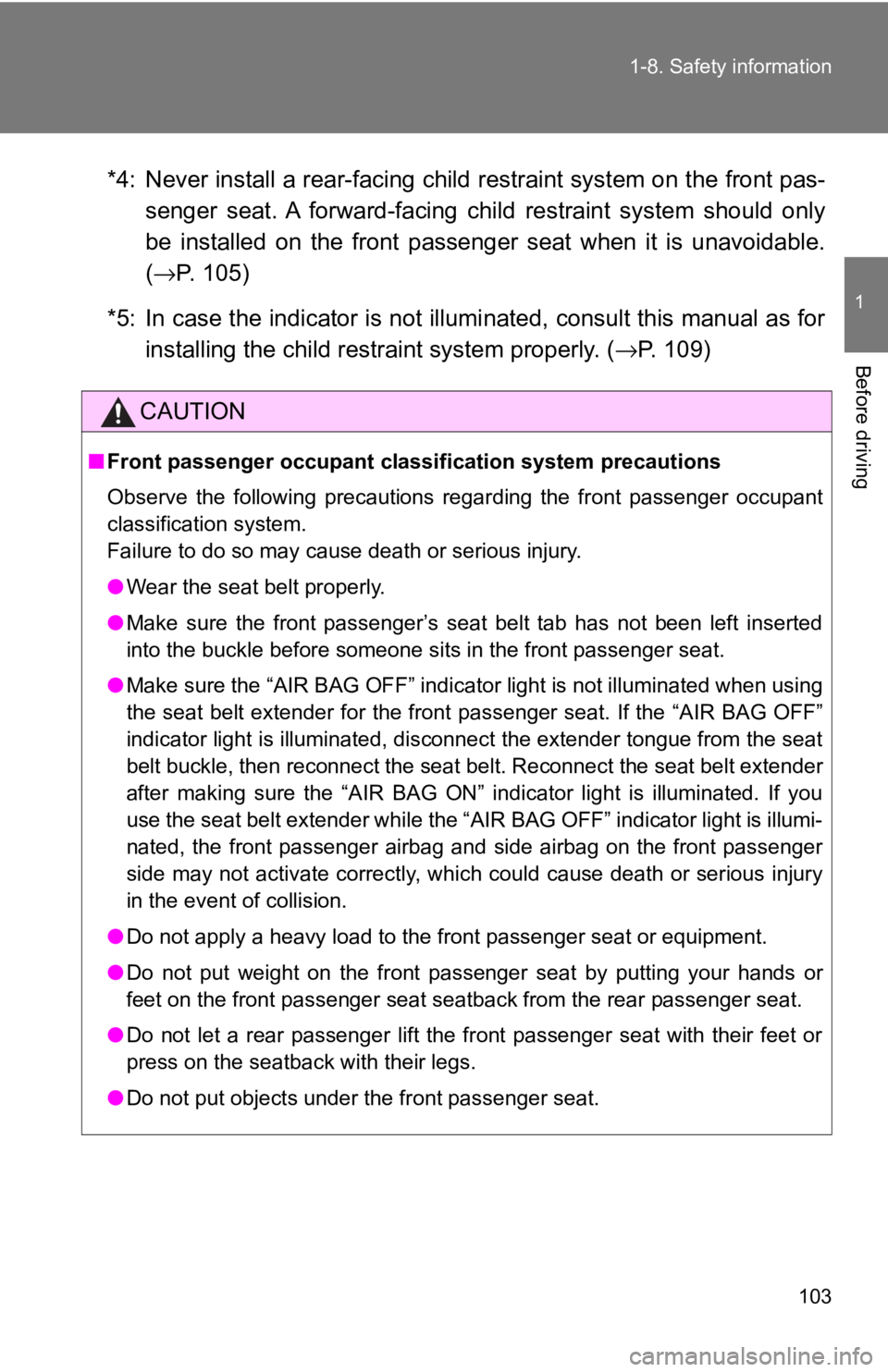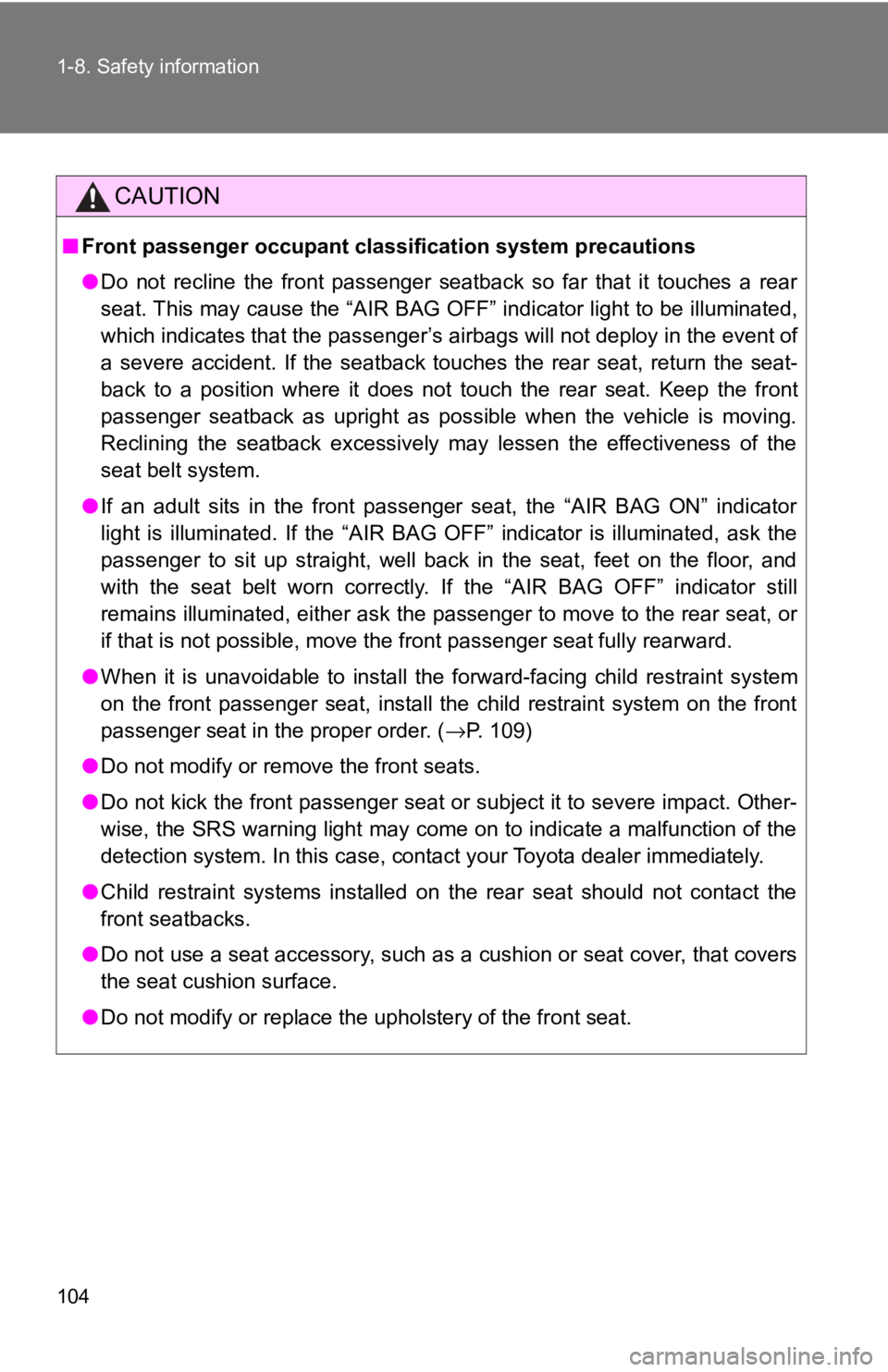Page 97 of 444
97
1-8. Safety information
1
Before driving
CAUTION
■
SRS airbag precautions
●Do not allow a child to sit on the knees
of a front passenger while the vehicle is
moving.
● Do not drive the vehicle while the driver
or passenger has items resting on their
knees.
● Do not lean against the door, the roof
side rail or the front, side and rear pil-
lars.
● Do not allow anyone to kneel on the
passenger seat toward the door or put
their head or hands outside the vehicle.
● Do not attach anything to or lean any-
thing against areas such as the dash-
board, steering wheel pad or lower
portion of the instrument panel.
These items can become projectiles
when SRS driver, front passenger and
knee airbags deploy.
Page 101 of 444
101
1-8. Safety information
1
Before driving
Conditions and operation of the front passenger occupant classification system
■
Adult*1
■Child*3 or child restraint system*4
Indicator/
warning light “AIR BAG ON” and “AIR BAG OFF” indi-
cator lights “AIR BAG
ON”
SRS warning light Off
Front passenger’s seat belt reminder light Flashing
*2
Devices Front passenger airbag
Activated
Side airbag on the front
passenger seats
Curtain shield airbag in the front passenger side
Front passenger’s seat belt pretensioner
Indicator/
warning light “AIR BAG ON” and “AIR BAG OFF” indi-
cator lights “AIR BAG
OFF”
*5
SRS warning light Off
Front passenger’s seat belt reminder light Flashing
*2
Devices Front passenger airbag
Deactivated
Side airbag on the front
passenger seats
Curtain shield airbag in the front passenger side Activated
Front passenger’s seat belt pretensioner
Page 102 of 444

102 1-8. Safety information
■Unoccupied
■ There is a malfunction in the system
*1: The system judges a person of adult size as an adult. When a smaller adult sits in the front pa ssenger seat, the system may rec-
ognize him/her as a child depending on his/her physique and pos-
ture.
*2: In the event the front passeng er does not wear a seat belt.
*3: When a larger child who has outgrown a child restraint system sits in the front passenger sea t, the system may recognize him/
her as an adult depending on hi s/her physique or posture.
Indicator/
warning light “AIR BAG ON” and “AIR BAG OFF” indi-
cator lightsNot illuminated
SRS warning light Off
Front passenger’s seat belt reminder light
Devices Front passenger airbag
Deactivated
Side airbag on the front
passenger seats
Curtain shield airbag in the front passenger side Activated
Front passenger’s seat belt pretensioner Deactivated
Indicator/
warning light “AIR BAG ON” and “AIR BAG OFF” indi-
cator lights “AIR BAG
OFF”
SRS warning light On
Front passenger’s seat belt reminder light Off
Devices Front passenger airbag
Deactivated
Side airbag on the front
passenger seats
Curtain shield airbag in the front passenger side Activated
Front passenger’s seat belt pretensioner
Page 103 of 444

103
1-8. Safety information
1
Before driving
*4: Never install a rear-facing child
restraint system on the front pas-
senger seat. A forward-facing child restraint system should only
be installed on the front passenger seat when it is unavoidable.
( → P. 105)
*5: In case the indicator is not illumi nated, consult this manual as for
installing the child restraint system properly. ( →P. 109)
CAUTION
■Front passenger occupant classification system precautions
Observe the following precautions regarding the front passenger occupant
classification system.
Failure to do so may cause death or serious injury.
●Wear the seat belt properly.
● Make sure the front passenger’s seat belt tab has not been left inserted
into the buckle before someone sits in the front passenger seat.
● Make sure the “AIR BAG OFF” indicator light is not illuminated when using
the seat belt extender for the front passenger seat. If the “AIR BAG OFF”
indicator light is illuminated, disconnect the extender tongue from the seat
belt buckle, then reconnect the seat belt. Reconnect the seat belt extender
after making sure the “AIR BAG ON” indicator light is illuminated. If you
use the seat belt extender while the “AIR BAG OFF” indicator light is illumi-
nated, the front passenger airbag and side airbag on the front passenger
side may not activate correctly, which could cause death or serious injury
in the event of collision.
● Do not apply a heavy load to the front passenger seat or equipment.
● Do not put weight on the front passenger seat by putting your hands or
feet on the front passenger seat seatback from the rear passenger seat.
● Do not let a rear passenger lift the front passenger seat with their feet or
press on the seatback with their legs.
● Do not put objects under the front passenger seat.
Page 104 of 444

104 1-8. Safety information
CAUTION
■Front passenger occupant classification system precautions
●Do not recline the front passenger seatback so far that it touches a rear
seat. This may cause the “AIR BAG OFF” indicator light to be illuminated,
which indicates that the passenger’s airbags will not deploy in the event of
a severe accident. If the seatback touches the rear seat, return the seat-
back to a position where it does not touch the rear seat. Keep the front\
passenger seatback as upright as possible when the vehicle is moving.
Reclining the seatback excessively may lessen the effectiveness of the
seat belt system.
● If an adult sits in the front passenger seat, the “AIR BAG ON” indicator
light is illuminated. If the “AIR BAG OFF” indicator is illuminated, ask the
passenger to sit up straight, well back in the seat, feet on the floor, and
with the seat belt worn correctly. If the “AIR BAG OFF” indicator still
remains illuminated, either ask the passenger to move to the rear seat, or
if that is not possible, move the front passenger seat fully rearward.
● When it is unavoidable to install the forward-facing child restraint system
on the front passenger seat, install the child restraint system on the front
passenger seat in the proper order. ( →P. 109)
● Do not modify or remove the front seats.
● Do not kick the front passenger seat or subject it to severe impact. Other-
wise, the SRS warning light may come on to indicate a malfunction of the
detection system. In this case, contact your Toyota dealer immediately.
● Child restraint systems installed on the rear seat should not contact the
front seatbacks.
● Do not use a seat accessory, such as a cushion or seat cover, that covers
the seat cushion surface.
● Do not modify or replace the upholstery of the front seat.
Page 105 of 444
105
1
1-8. Safety information
Before driving
Child restraint systems
Points to rememberStudies have shown that installing a child restraint system on a rear
seat is much safer than installi ng one to the front passenger seat.
● Choose a child restraint system appropriate to the age and size of
the child.
● For installation details, follow the instructions provided with the
child restraint system.
General installation instructions are provided in this manual.
(→ P. 109)
A child restraint system for a small child or baby must be properly
restrained on the seat with the la p portion of the lap/shoulder belt.
The laws of all 50 states of U.S.A. and Canada now require the use of
child restraint systems.
Page 106 of 444
106 1-8. Safety information
Types of child restraintsChild restraint systems are clas sified into the following 3 types
according to the age and size of the child.
Infant seat
Convertible seat
Booster seat
Page 107 of 444
107
1-8. Safety information
1
Before driving
■
Selecting an appropriat e child restraint system
Get an appropriate child restraint system for the child. If a child is too large
for a child restraint system, sit the child on a rear seat and use the vehicle's
seat belt. ( →P. 60)
CAUTION
■Child restraint precautions
●For effective protection in automobile accidents and sudden stops, a child
must be properly restrained, using a seat belt or child restraint system
depending on the age and size of the child. Holding a child in your arms is
not a substitute for a child restraint system. In an accident, the child can be
crushed against the windshield, or between you and the vehicle's interior.
● Toyota strongly urges the use of a proper child restraint system that con-
forms to the size of the child, installed on the rear seat. According to acci-
dent statistics, the child is safer when properly restrained in the rear seat
than in the front seat.